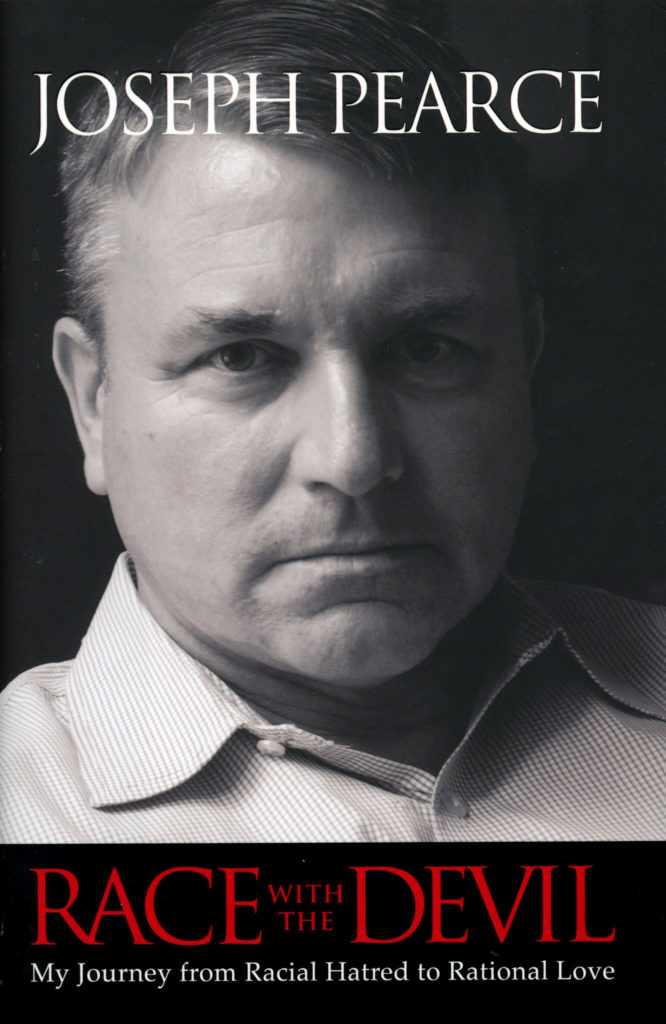“I am not writing a biography but a conversion story,” Joseph Pearce explains in his new book, “Race With the Devil.” His was a Christian conversion in the strict sense that it represented a full turnaround of his life.
A Catholic today, Pearce during his teens became a white supremacist in England, devoting his talents then and in his early 20s to promoting racism. “I was a leading member of the National Front, a white supremacist organization that demanded the forced removal of all nonwhites from the United Kingdom,” he says.
Pearce was imprisoned twice for publishing material “deemed likely to incite racial hatred.” By the time of his second conviction at age 24, however, the seeds of his conversion were germinating “deep inside” him.
Over the course of three years following his prison release, the journey leading to his 1989 reception into the church slowly unfolded.

While “Race With the Devil” is not a biography per se, much about it is biographical. Before telling of Pearce’s “purgatorial ascent from racial hatred to rational love,” the book follows his “downward path from childhood innocence into the infernal bowels of a hate-filled youth.”
Inescapably, therefore, the book is about his life: his experiences growing up; people who played roles in his life for better and for worse; his goals at various points in time; his assessments of society; his roles now as husband, father and writer.
What I found of considerable interest in “Race With the Devil” were Pearce’s attempts to give an accounting of the path he gradually discovered that led him to the church.
No doubt, there is an element of mystery in every conversion. It is said, after all, that God can write straight with crooked lines. Pearce affirms that God can mold “the most unpromising of clay.”
Given the mystery of God’s presence, it cannot be easy to give an accounting of the factors that prompt a person to turn away from one consuming way of living and thinking, and instead to take up the ways of Christian faith.
Pearce concluded over time that his powers of reason alone did not explain his conversion. “A process of healing coincided with the engagement with reason, a healing process that was not contrary to reason but was necessary to it,” he says.
Three occasions described in the book reveal that Pearce virtually was startled to attention by the goodness of individuals who acted selflessly on his behalf, individuals who might have disdained him or ignored his needs. In such individuals he noticed a “charm of goodness.”
On one occasion a policeman somewhat surprisingly agreed to lend a bit of money to him, which the youthful Pearce promised to repay. Pearce comments: “How different was the heart of this one good man from my own cankered heart, filled with the hatred of my neighbor and the misery it causes.”
[quote_box_right]
Related content
Article: Chesterton expert wows Legatus members
George Weigel column: G.K. Chesterton, ‘major English author’[/quote_box_right]
His discovery of G.K. Chesterton’s writings came as “an unexpected surprise” for Pearce. “I can still remember the thrill that I received when reading Chesterton’s political philosophy for the first time,” Pearce informs readers.
In Chesterton, a 20th-century British writer and intellectual who himself became a Catholic, Pearce found “a new friend who would become the most powerful influence (under grace)” on his “personal and intellectual development over the following years.”
Pearce was to publish a biography of Chesterton in 1996. A biography of the British Catholic writer Hilaire Belloc, a contemporary of Chesterton’s, also is counted among Pearce’s numerous writing credits, as is a book on the life and Catholic faith of J.R.R. Tolkien, author of “The Lord of the Rings.”
Conversion stories like Pearce’s do not end with a person’s reception into the church. Entering the church concludes one stage of a faith journey while at once marking a new beginning in a journey that, I assume, lasts a lifetime.
Today Pearce is 53. I cannot help but wonder if, perhaps 10 or 15 years hence, he might write yet again of his conversion and, in the process, continue to cast light on what “conversion” truly means.
Pearce says: “The journey is not yet over. Life is a perilous quest, and I am still very much on it. I have my dragons to face and my sins to be forgiven.”
His first confession cleansed him of his “numerous past sins,” he says, but it “did not remove” his responsibility “to make amends for all the damage” they caused.
Today, the church’s sacramental life “is at the very heart of my own life,” Pearce states. He acknowledges, though, that reception into the church did not mean becoming “a saint overnight.” He then adds: “I am, however, making progress. My soul, like the soul of every one of life’s pilgrims, is a work in progress.”
— Reviewed by David Gibson, Catholic News Service. Gibson was the founding editor of Origins, Catholic News Service’s documentary service. He retired in 2007 after holding that post for 36 years.







